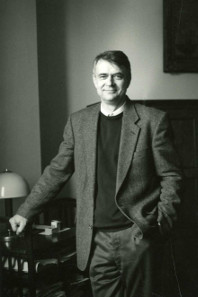by Ursula Kampmann
October 9, 2014 – There was one thing Bernd Kluge emphasized when he was asked what he thought positive about the Turnaround from the GDR to the FRG. He replied that he was finally allowed to incorporate the Prussian element into his name through his employer, the Stiftung Preußischer Kulturbesitz. After all, Bernd Kluge had always identified himself with the Prussian element and the accompanying virtues.
Bernd Kluge. Photo: Helga Paris.
Godliness and tolerance – Born on 18 June, 1949, in Cottbus, Bernd Kluge was one of the few GDR children who experienced First Communion and Confirmation instead of the ‘Jugendweihe’ thanks to their Catholic home. Despite his critical attitude towards the Socialist State the talented boy managed to take his ‘Abitur’ (German school leaving certificate) and study medieval history at the Humboldt University Berlin afterwards.
Sincerity – Although his thesis supervisor Bernhard Töpfer would have liked Bernd Kluge to stay at the university and succeed him, the young academic decided in favor of the Münzkabinett at the Bode Museum which was a refuge for all who wanted nothing else than to engage in academic work irrespective of party membership and politics.
Studiousness – When Bernd Kluge started working at the Münzkabinett he knew nothing about numismatics. After just a couple of years, though, he had become one of the great experts of medieval coinage. His list of publications comprised – as Bernhard Weisser had thankfully counted – as many as 216 items. And these items are by no means petty articles in obscure journals, but important standard works of reference, like – to mention only one out of the 216 items – his “Handbuch und Thesaurus Nummorum Medii Aevi”, a revision book of everything we know about medieval numismatics today.
Discipline – With the Berlin Münzkabinett, Bernd Kluge experienced the turmoil of the Turnaround first-hand and was faced with the situation – just when the first obstacles had successfully been negotiated – that Wolfgang Steguweit receded from the office as director and gave him, i.e. Bernd Kluge, the choice whether to assume the office himself or rather to take the risk of an unknown museum director from the west who was unfamiliar with the conditions. Actually, Bernd Kluge never intended to become director, but that was just what happened after all in 1992. He did not do it because he wanted to satisfy his ambition but simply because someone had to do this job. The cherished academic work was postponed to the late hours and the weekends.
Open-mindedness – One of the first tasks the newly-minted director of the Münzkabinett addressed himself to was to organize the XIIth International Numismatic Congress in Berlin who attracted hundreds of numismatists. Bernd Kluge acquitted himself well as a marvelous host who, thanks to his humor, made himself many friends and, due to his straightforwardness, scared away one or two.
Sense of duty – There is hardly any other museum director who has made such a difference and changed so much during his active career. Bernd Kluge not only conceptualized the new permanent numismatic exhibition in the Bode Museum and oversaw its realization but he, in his function as head of the house, also exerted a great influence in the fundamental renovation of the Münzkabinett during 1998 and 2006. He is said to not have missed one single meeting concerning construction matters, in order to make his vision of a careful renovation of the historical edifice become reality.
Courage without self-pitying – Even though he was at times appalled by – and at this point we would like to give you a quote from the entertaining congratulations written by Bernhard Weisser in NNB Oct. 2014, pp. 424 – ‘the sometimes tedious communication processes that were subject to particular interests and were far from being effective’ of the various, ‘science organizing’ committees, Bernd Kluge nevertheless acted as President of the ‘Numismatische Kommission der Länder’ from 1993 until 1999.
Loyalty – His staff thinks highly of him as a fair, open-minded and caring principal who, just like a Pater Familias in the best sense of the word, lived his ideal of a community of devoted academics who are tied together in friendship.
Modesty – His colleagues appreciate Bernd Kluge’s unpretentious demeanor. He would never boast about his achievements, and so he will condone with a smile the fact that this laudation inevitably skips so many of his merits.
We are happy that the end of the official administrative duties at the Berlin Münzkabinett now provides Bern Kluge with the time required in order to finally finish his history of the Saxon and Francish Empire that is going to replace the work written by Hermann Dannenberg.





